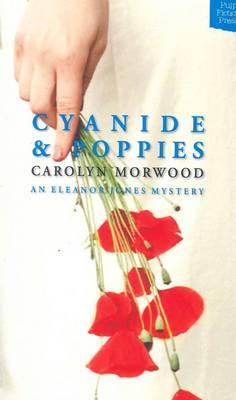Another Eleanor Jones krimie set in 1923 Melbourne during a police strike: Carolyn Morwood, Cyanide and Poppies (2012).

Eleanor is now a reviewer for ‘The Argus.’ Nicholas is still there; his wife is not. Andrew has returned from, of all places, Dimboola, but is as fragile as cracked crystal and less stable.
Slow and thoughtful. Eleanor is introspective but it never feels like superfluous padding as it so often does in many of the Chick-Krimies that I sample and reject. Morwood brings Melbourne of the age alive with gravity in contrast, say to Miss Fisher with her bold and brassy and superficial appurtenances like cars, clothes, etc. If Miss Fisher, god love her, is nearly a cartoon, Eleanor is nearly a tragic heroine the 19th Century. They are both treasures.
Eleanor is a very serious person who served as a nurse during World War I in Palestine and France. She has seen much death and more suffering and been unable to do anything much about either. Her fiancée and her older brother were both killed in France, and the younger brother Andrew, who also served in France, returned psyched out. Not much fun there.
Her childhood sweetheart Nicholas is married but his wife seems to be permanently away, perhaps never to return. No one knows, perhaps not even Nicholas. He helped Eleanor get the job at the newspapers and they spend time together wondering no doubt how what might have been or what might be….
Meanwhile the hoons feel licensed by absence of police, most of whom are on strike. Vigilantes organise in turn. Libertarian hoon versus self-righteous thug is the result.
Within this context it is an engrossing study of relationships distorted by the gravity of a murder. The victim is a nosy, unpleasant journalist, who was perhaps given to blackmail. Andrew’s girlfriend, not quite girlfriend but might be, is the suspect. It is Sister Jones to the rescue.
There is much about Eleanor managing Andrew, trying to do it without his awareness. Their rapprochement and cooperation is well done. Inspector Pearce is well meaning and competent but under much pressure because of the Police Strike. The tension between Eleanor and Nicholas Bird is unrelenting. His daughter Kate is instrumental in the denouement, at first reluctantly but then willingly. ‘Reluctantly’ because Kate sees Eleanor as a threat to her absent mother or Kate’s own monopoly of Nicholas. But Kate, too, wants to help the innocent Nadine, Andrew’s deuce girlfriend, so she joins the plot.
There is to’ing and fro’ing in Melbourne and out, namely a train ride to and from Dimboola.
Nice touches, how the same facts can be construed in different ways. I also liked the ambiguity of Nadine’s (the maybe girlfriend) claim to be a medium, though it was dropped completely after being such a big part of the buildup. Some kind of recognition, if not resolution, is needed on that, not just omission. Likewise the unresolved tension with the maid is magnified, and then not mentioned again.
Rachel, Nicholas’s absent wife, writes to ask for a divorce! I foresee much consternation ahead. Divorce might ruin him socially in Melbourne. Kate would react how? Would he then be free for Eleanor or would he be too injured and want to avoid contaminating her?
It was not hard to figure out the villain before Eleanor. The most sanctimonious ones are always at it in krimies, as often in life.
Skip to content
